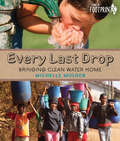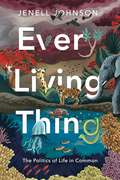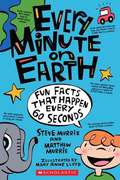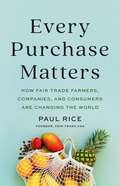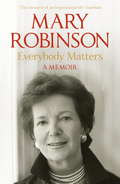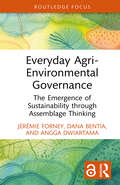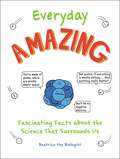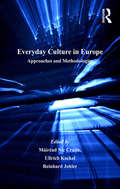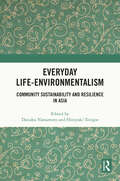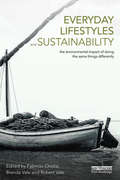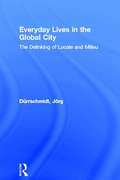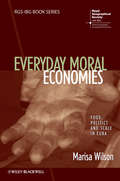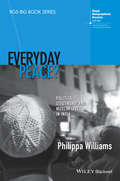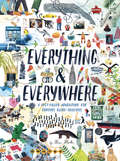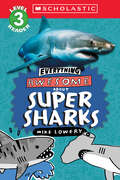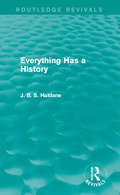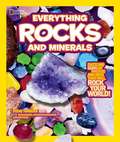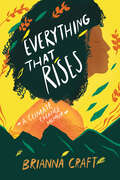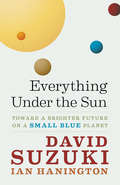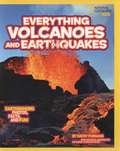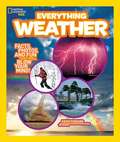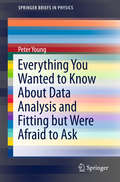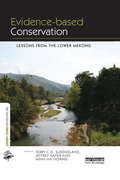- Table View
- List View
Every Last Drop: Bringing Clean Water Home (Orca Footprints)
by Michelle MulderIn the developed world, if you want a drink of water you just turn on a tap or open a bottle. But for millions of families worldwide, finding clean water is a daily challenge, and kids are often the ones responsible for carrying water to their homes. Every Last Drop looks at why the world's water resources are at risk and how communities around the world are finding innovative ways to quench their thirst and water their crops. Maybe you're not ready to drink fog, as they do in Chile, or use water made from treated sewage, but you can get a low-flush toilet, plant a tree, protect a wetland or just take shorter showers. Every last drop counts!
Every Living Thing: The Politics of Life in Common (RSA Series in Transdisciplinary Rhetoric)
by Jenell JohnsonThis book examines the question of what we mean when we talk about life, revealing new insights into what life is, what it does, and why it matters. Jenell Johnson studies arguments on behalf of life—not just of the human or animal variety, but all life. She considers, for example, the Standing Rock Sioux tribe’s fight for water, deep ecologists’ Earth First! activism, the Voluntary Human Extinction Movement, and astrophysicists’ positions on Martian microbes. What she reveals is that this advocacy—vital advocacy—expands our view of what counts as life and shows us what it would mean for the moral standing of human life to be extended to life itself.Including short interviews with celebrated ecological writer Dorion Sagan, former NASA Planetary Protection Officer Catharine Conley, and leading figure in Indigenous and environmental studies Kyle Whyte, Every Living Thing provides a capacious view of life in the natural world. This book is a must-read for anyone interested in biodiversity, bioethics, and the environment.
Every Minute on Earth: Fun Facts that Happen Every 60 Seconds
by Matthew Murrie Steve MurrieDiscover all of the amazing things that can happen around the world in just one minute! In the minute it could take you to read this page, the Earth will be hit by 6,000 lightning strikes; 2,137 pounds of popcorn will be eaten; 10,000 pieces of skin will be lost from your body; 21,000 pizzas will be baked; 954 camera phones will be sold worldwide; the International Space Station will travel 289 miles in its orbit around the Earth; and 750,000 gallons of water will tumble over Niagara Falls. The Earth and its inhabitants are active every minute of the day. Isn't it amazing what can happen in such a short amount of time?
Every Purchase Matters: How Fair Trade Farmers, Companies, and Consumers Are Changing the World
by Paul RiceFrom the founder and CEO of Fair Trade USA, a critical account of the past, present and future of conscious capitalism--the change it has wrought in the world and the potential it still has to confront our greatest challenges. We all have the power to change the world through the products we buy. This simple premise has driven the growth of the conscious consumer movement for decades. Indeed, what started with a handful of niche sustainability brands has exploded into the mainstream with labels like Organic, Non-GMO, and Fair Trade Certified now adorning products in major retailers across the country. Yet the true promise of ethical sourcing and conscious consumerism has not been fully realized. Paul Rice has dedicated his career to helping consumers and businesses embrace the power they have to protect the environment and improve the lives of farmers and workers on the far side of our global supply chains. In Every Purchase Matters, Rice reveals the untold story of the Fair Trade movement and its significance for us all. Calling on the close relationships he cultivated over the last forty years with the pioneers of ethical sourcing—CEOs, activists, grassroots farmer leaders, and consumer advocates—Rice gives voice to the visionaries and practitioners who are making sustainable business the new normal. These protagonists share successes and failures, lessons learned, and their extraordinary impact in communities around the world. Their stories illuminate how sustainability is good not only for people and planet but also for business. Whether you&’re a consumer, a business leader, or an investor, Every Purchase Matters offers a rich and persuasive case for conscious capitalism—the change it has brought and the potential it still has to create a more just, equitable, and sustainable world.
Everybody Matters: A Memoir
by Mary RobinsonShortlisted for the Political Book Awards 2013 Political Book of the YearThe first woman President of Ireland, who became UN High Commissioner for Human Rights, Mary Robinson has spent her life in pursuit of a fairer world.Now, for the first time, she reveals what lies behind the vision, strength and determination that has helped her to achieve so much for human rights around the globe.She describes the upbringing which gave her her strong sense of values and how she came into painful conflict with her parents - marrying against their wishes and, later, helping to legalise contraception in a deeply Catholic Ireland.As a barrister she won landmark cases advancing the causes of women and the marginalised against the prejudices of the day. When - to the surprise of many - she became the first woman President of Ireland in 1990, she put Ireland firmly on the international stage.Accepting the position of UN High Commissioner for Human Rights in 1997 was her biggest challenge and here she describes the huge political difficulties she encountered among the many triumphs. Subsequently, based in New York, she led Realizing Rights for eight years, pioneering how to implement in practice economic and social rights: working in African countries on health, decent work, corporate responsibility and women's empowerment in peace and security. Now heading her own Climate Justice foundation she has succeeded in finding the independence she needs to work effectively on behalf of the millions of poor around the world most affected by climate change. Told with the same calm conviction and modest pride that has guided her life, Everybody Matters will inspire everyone who reads it with the belief that each of us can, in our own way, help to change the world for the better.
Everybody Needs a Rock
by Byrd BaylorBaylor provides ten rules for finding a rock. "Not just any rock, Baylor is careful to note, but 'a special rock that you find yourself and keep as long as you can--maybe forever."
Everyday Agri-Environmental Governance: The Emergence of Sustainability through Assemblage Thinking (Routledge Focus on Environment and Sustainability)
by Jérémie Forney Dana Bentia Angga DwiartamaRevitalising the way the social sciences question agri-environmental governance, this book introduces "the everyday governance approach" as a means to improving the sustainability of agriculture and food systems.The "everyday" refers to localised practices, specific networks, and practical norms that emerge in a process of interaction, translation, and reinterpretation. The authors build this approach on assemblage thinking and theory, which focuses on the collective production of the social through complex sets of connections. For this reason, assemblage thinking becomes a particularly productive guide in exploring how everyday governance is co-produced in the interaction between numerous social processes involving a diversity of actors and instruments. The authors navigate between original and contrasting case studies from Switzerland, Indonesia, and the European Union in order to reorient attention to the transformative nature of governance, which they locate along four different dimensions of the everyday: (1) the interdependence of instruments within a wider governance assemblage; (2) the uncertainty and unpredictability of effects in agri-environmental governance; (3) the distributed nature of agency and its implication for power relations; (4) the importance of capacities in the transformation of agri-food systems. This book calls for a redesigning of agri-environmental governance that should move away from the setting of fix and precise objectives and solutions, and rather aim for a consolidation of sound foundations on which desirable futures can emerge.The book will be an essential read for students and scholars interested in sustainable agriculture and food systems, governance modes and approaches, and sustainability more broadly.
Everyday Amazing: Fascinating Facts about the Science That Surrounds Us
by Beatrice the BiologistLike fan mail addressed to the natural world, Everyday Amazing is filled with uplifting and interesting musings on science from Beatrice the Biologist. Beatrice the Biologist is an easily amused former high school biology teacher with a soft spot for the mind-blowing science we encounter daily that we often take for granted. In Everyday Amazing, she shines the spotlight on ten different types of amazing everyday scientific facts in short chapters full of fun and fascinating tidbits bound to both entertain you and expand your horizons! Learn the basics of atomic science, sound waves, bioscience, microbiology, and more in accessible chapters offering a fresh perspective on concepts you may have learned about, but aren’t totally clear on. Quirky illustrations throughout add to the fun! Fall in love with science with Beatrice the Biologist in Everyday Amazing!
Everyday Culture in Europe: Approaches and Methodologies (Progress In European Ethnology Ser.)
by Máiréad Nic CraithThis book discusses the history and contemporary practice of studying cultures 'at home', by examining Europe's regional or 'small' ethnologies of the past, present and future. With the rise of nationalism and independence in Europe, ethnologies have often played a major role in the nation-building process. The contributors to this book offer case studies of ethnologies as methodologies, showing how they can address key questions concerning everyday life in Europe. They also explore issues of European integration and the transnational dimension of culture in Europe today, and examine how regional ethnologies can play a crucial part in forming a wider 'European ethnology' as local participants have experience of combining identities within larger regions or nations.
Everyday Life-Environmentalism: Community Sustainability and Resilience in Asia
by Daisaku Yamamoto Hiroyuki TorigoeThis book provides one of the first systematic introductions to the Japanese concept of life-environmentalism, Seikatsu-Kankyo Shugi. This concept emerged in the 1980s as a shared research framework among Japanese social scientists studying the adverse consequences of postwar industrialization on everyday life in communities. Life-environmentalism offers a lens through which the agency of small communities in sustaining their everyday life and living environment can be understood. The book provides an overview of this approach, including intellectual backgrounds and foundational concepts, along with a variety of empirical case studies that examine environmental and sustainability issues in Japan and other parts of Asia. It also includes critical reflections on the approach in light of contemporary sustainability challenges. The empirical topics covered in the book include local community responses to development projects, resource governance, disaster response and recovery, and historical environmental preservation. The chapters are contributed by researchers working at the forefront of the field. It provides only a glimpse into the vast literature that awaits further exploration and engagement in the future. The book is suitable for upper undergraduate students, graduate students, and researchers interested in environmental problems, sustainability and resilience, disaster mitigation and response, and regional development in Asian contexts, particularly Japan. It is well-suited for courses in anthropology, geography, sociology, urban and regional planning, political science, Asian studies, and environmental studies.
Everyday Lifestyles and Sustainability: The Environmental Impact Of Doing The Same Things Differently
by Robert Vale Brenda Vale Fabricio ChiccaThe impact of humanity on the earth overshoots the earth’s bio-capacity to supply humanity’s needs, meaning that people are living off earth’s capital rather than its income. However, not all countries are equal and this book explores why apparently similar patterns of daily living can lead to larger and smaller environmental impacts. The contributors describe daily life in many different places in the world and then calculate the environmental impact of these ways of living from the perspective of ecological and carbon footprints. This leads to comparison and discussion of what living within the limits of the planet might mean. Current footprints for countries are derived from national statistics and these hide the variety of impacts made by individual people and the choices they make in their daily lives. This book takes a ‘bottom-up’ approach by calculating the footprints of daily living. The purpose is to show that small changes in behaviour now could avoid some very challenging problems in the future. Offering a global perspective on the question of sustainable living, this book will be of great interest to anyone with a concern for the future, as well as students and researchers in environmental studies, human geography and development studies.
Everyday Lives in the Global City: The Delinking of Locale and Milieu
by Jörg DürrschmidtRejecting simplifying notions of globalisation as a macro-economic force, this book provides a grounded picture of the various ways in which people's biographies are tied up with the global cultural economy. The main argument of the book is that the globalisation of lives is experienced by people as the 'extension' of their 'milieux' both spatially and symbolically.
Everyday Moral Economies: Food, Politics and Scale in Cuba (RGS-IBG Book Series)
by Marisa WilsonOffering a rare glimpse of rural life in modern-day Cuba, this book examines how ordinary Cubans carve out their own spaces for ‘appropriate’ acts of consumption, exchange, and production within the contradictory normative and material spaces of everyday economic life. Discusses the conflict between the socialist-welfare ideal of food as an entitlement and the market value of food as a commodity Bridges the fields of human geography and anthropology Approaches food networks and the scale of food systems in a novel way Provides a comprehensive look at Cuba today, with coverage of history, politics, economics, and social and environmental justice Enhanced by vivid photos from the field
Everyday Peace?: Politics, Citizenship and Muslim Lives in India (RGS-IBG Book Series)
by Philippa WilliamsWinner of the 2016 Julian Minghi Distinguished Book Award of the Political Geography Specialty Group at the AAGProviding important insights into political geography, the politics of peace, and South Asian studies, this book explores everyday peace in northern India as it is experienced by the Hindu-Muslim community. Challenges normative understandings of Hindu-Muslim relations as relentlessly violent and the notion of peace as a romantic endpoint occurring only after violence and political maneuverings Examines the ways in which geographical concepts such as space, place, and scale can inform and problematize understandings of peace Redefines the politics of peace, as well as concepts of citizenship, agency, secular politics, and democracy Based on over 14 months of qualitative and archival research in the city of Varanasi in Uttar Pradesh, India
Everything & Everywhere: A Fact-Filled Adventure for Curious Globe-Trotters
by Marc MartinFrom Hong Kong to Reykjavík, Ulaanbaatar to New York City, enjoy a lush and unexpected journey around the world to discover what makes each place unique. Sleepy sloths, colorful cows, staggering skylines, terrible traffic—countless surprises await! All you need is a good guide and a little curiosity . . . so, what are you waiting for? Let's go! From award-winning author and illustrator Marc Martin comes a quirky, fact-filled adventure for curious globe-trotters, young and old.
Everything Awesome About: Super Sharks (Everything Awesome About)
by Mike LoweryLearn everything that's AWESOME about sharks, in this nonfiction Reader that combines cartoon illustrations and photographs!Do you know which shark has 25 rows of backward-facing teeth? Or which shark is covered in a protective stinky slime? It's time to meet... the SUPER SHARKS!Find out all this and more, in Everything Awesome About: Super Sharks, a one-stop shop for the shark-obsessed kid who wants to start reading on their own! With a highly visual approach that mixes kid-friendly cartoons and engaging photographs, this Reader packs in the facts and is sure to become a quick favorite for shark obsessives.Learn the top facts about your favorite shark breeds, and everything that's awesome about the most feared creatures in the sea. This Level 3 Reader is perfect for kids who are starting to read on their own, and want to build reading confidence and develop vocabulary skills while learning cool facts about their favorite beasts.Be sure to check out more in this series, with Everything Awesome About: Dangerous Dinosaurs!
Everything Has a History (Routledge Revivals)
by J. B. HaldaneIn this collection, first published in 1951, the central theme is that everything has a history, and that we cannot fully understand anything without some knowledge of its history. Professor Haldane writes mainly on geology, astronomy and zoology, but includes a variety of other topics, including eugenics, Einstein, and C. S. Lewis. His outlines of zoology, of the geology of England, and of the evidence for astronomical theories, will be of great use to students and teachers.
Everything Rocks and Minerals
by Steve Tomecek Carsten PeterThis book describes how rocks and minerals are formed by geological processes, and how they are used in our lives.
Everything Rocks and Minerals: Dazzling Gems Of Photos And Info That Will Rock Your World (National Geographic Kids Everything Ser.)
by Steve Tomecek Carsten Peter National Geographic ExplorerNIMAC-sourced textbook
Everything That Rises: A Climate Change Memoir
by Brianna CraftOne of Ms. magazine's "Most Anticipated Feminist Books of 2023"Authentic and inspiring, Everything That Rises personalizes the realities of climate change by paralleling our relationship to the planet with the way we interact within our own homes. Nineteen-year-old Brianna Craft is having a panic attack. A professor's matter-of-fact explanation of the phenomenon known as "climate change" has her white-knuckling the table in her first environmental studies lecture. Out of her father's house, she was supposed to be safe. This moment changed everything for Brianna. For her first internship, she jumped at the chance to assist the Least Developed Countries Group at the United Nations' negotiations meant to produce a new climate treaty. While working for those most ignored yet most impacted by the climate crisis, she grappled with the negligent indifference of those who hold the most power. This dynamic painfully reminded her of growing up in a house where the loudest voice always won and violence silenced those in need. Four years later, Brianna witnessed the adoption of the first universal climate treaty, the Paris Agreement. In this memoir that blends the political with the personal, Brianna dives into what it means to advocate for the future, and for the people and places you love, all while ensuring your own voice doesn't get lost in the process. It will take all of us to protect our home.
Everything Under the Sun
by David Suzuki Ian HaningtonIn this compilation of David Suzuki's latest thoughts and writings, the renowned scientist, author, and broadcaster explores the myriad environmental challenges the world faces and their interconnected causes. In doing so, Suzuki shows that understanding the causes-and recognizing that everything in nature, including us, is interconnected-is crucial to restoring hope for a better future. The solutions are there, he argues; we just need the will to act together to bring about change.Everything Under the Sun delves into such provocative topics as the difference between human hunters and other predators, the lessons we must learn from the devastating earthquake and tsunami in Japan and the subsequent meltdown of the nuclear reactors, and our dependence on the sun for all of our food and energy-indeed for our very lives. Suzuki also considers the many positive steps people are making today. And he doesn't shy away from controversial opinion, especially when it comes to taking on those who stand in the way of resolving serious issues like climate change.Underpinning it all is the recognition that we are blessed to live on a planet that gives us everything we require to live, under a sun that gives us the energy we need to produce food and transport and modern conveniences. But we must protect what we have if we want to survive and prosper.
Everything Volcanoes and Earthquakes (National Geographic Kids Everything)
by Kathy Furgang Carsten PeterNational Geographic Kids Everything Volcanoes and Earthquakes explodes with incredible photos and amazing facts about the awesome powers of nature. <P><P>You'll find out that three-quarters of Earth's volcanoes are underwater, that an earthquake in Chile shortened the day by 1.26 milliseconds, and much more. <P><P>Bursting with fascinating information about the biggest volcanic eruptions and earth-shattering earthquakes, this book takes a fun approach to science, introducing kids to plate tectonics and the tumultuous forces brewing beneath the Earth's surface.
Everything Weather: Facts, Photos, And Fun That Will Blow Your Mind! (National Geographic Kids Everything Series)
by Kathy Furgang National Geographic Kids StaffWeather can be wild, freaky, and fascinating! <P><P>Powerful twisters roar through homes; earthquakes shatter whole cities; hurricanes fly through towns. How does it all happen and how do we know what we do? <P><P>All you need to know about weather and all of its wildness will be found in the pages of this colorful, energetic, and accessible book. <P><P>Kids will also learn about real-life encounters with wild weather from National Geographic tornado chaser, Tim Samaras, featured in "Explorer's Corners" throughout the book. <P><P>Packed with fun facts and amazing photographs, this book gives kids an in-depth look at these amazing natural phenomena.
Everything You Wanted to Know About Data Analysis and Fitting but Were Afraid to Ask
by Peter YoungThese notes describe how to average and fit numerical data that have been obtained either by simulation or measurement. Following an introduction on how to estimate various average values, they discuss how to determine error bars on those estimates, and how to proceed for combinations of measured values. Techniques for fitting data to a given set of models will be described in the second part of these notes. This primer equips readers to properly derive the results covered, presenting the content in a style suitable for a physics audience. It also includes scripts in python, perl and gnuplot for performing a number of tasks in data analysis and fitting, thereby providing readers with a useful reference guide.
Evidence-based Conservation: Lessons from the Lower Mekong (The Earthscan Forest Library)
by Terry C.H. Sunderland Jeffrey Sayer Minh-Ha HoangThere is a considerable gap between the science of conservation biology and the design and execution of biodiversity conservation projects in the field. Science is often failing to inform the practice of conservation, which remains largely experience-based. The main reason is the poor accessibility of evidence on the effectiveness of different interventions. This is the basis for this book adopting an 'evidence-based approach', modelled on the systematic reviews used in health sciences and now being applied to many policy arenas. Evidence-based Conservation brings together a series of case studies, written by field practitioners, that provides the evidence-base for evaluating how effective conservation and poverty alleviation strategies can be better implemented. A series of systematic reviews uses experiences and data from fifteen integrated conservation and development projects conducted in the Lower Mekong region, specifically in Vietnam, Laos and Cambodia. They provide wide-ranging overviews of the effectiveness of protected areas and how innovative tools and methods for monitoring and evaluation can be utilised for more effective outcomes. Results are in the form of management and policy recommendations, based on the quality of evidence and the cost-utility of the intervention. By bridging the gap between field practice and conservation, the analysis should lead to more effective integrated conservation and development interventions. The book represents one of the first attempts to apply the evidence-based approach to conservation and development.
